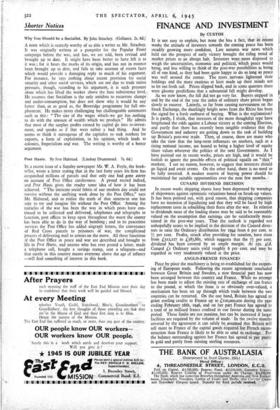FINANCE AND INVESTMENT
By CUSTOS
IT is not easy to explain, but none the less a fact, that in recent weeks the attitude of investors towards the coming peace has been steadily growing more confident, Last autumn war news which held out the prospect of early victory brought the rising trend of market prices to an abrupt halt. Investors were more disposed to weigh the uncertainties, economic and political, which peace would bring, and less willing to think of the post-war possibilities as being all of one kind, as they had been quite happy to do so long -as peace was well around the corner. The more_ nervous lightened their holdings and the more cautious at least made up their minds not to let out fresh sail. Prices =slippedback, and in some quarters there were gloomy predictions that a substantial fall might develop.
As we now know, the fall did not go very -far. Buyers stepped in and by the end of the year the index of ordinary share prices began slowly to recover. Latterly, so far from causing nervousness "on the Stock ExChange, the dazzlingly bright news from the Rhine has been the signal for a fresh outburst of buying. What is the explanation? It is partly, I think, that investors of the more thoughtful type have lengthened the odds against-a Labour victory at the coming Election, and partly that there has recently been tangible evidence that the 'Government and industry are getting down to the task of building up Britain's post-war trade. Then of course, there are many who take the view that the long-term influences on markets, such as a rising national income, are bound to bring a higher level of equity share values whatever the politics of the next Government. As I have pointed out in recent weeks, prices are high, and it would be foolish to ignore the possible effects of political squalls on " thin " markets. I see no reason, however, to suggest that investors should go liquid and await events. On the other hand, there is no- need to be fully invested. A modest reserve of buying power should be maintained for suitable opportunities over the next few months.
CUNT RD DIVIDEND DECISION
In recent weeks shipping shares have been depressed by warnings of shipowners against optimistic valuations based on break-up values. It has been pointed out, with good reason, that shipping companies have no intention of liquidating and that they will be faced by high replacement costs in rebuilding their fleets after the war. In relation to dividends most of the leading shares may be said to be reasonably valued on the assumption that earnings can be satisfactorily main- tained in the post-war years. That the outlook is regarded not unhopefully seems to be implied in the decision of the Cunard direc- tors to raise the Ordinary distribution -for 1944 from 6 per cent. to 71 per cent. Profits, struck after providing for taxation, have risen from £312,127 to £383,881, which suggests that the 71- .per cent. dividend has been covered by an ample margin. At 25s. 41a. Cunard Li Ordinary units yield roughly 6 per cent. and may be regarded as very moderately valued at the price.
ANGLO-FRENCH FINANCES Piece by piece the machinery is being re-established for the reopen- ing of European trade. Following the recent agreement concluded between Great Britain and Sweden, a new -financial pact has now been arranged between this country, and France. While no attempt has been made to adjust the existing rate of exchange of zoo francs to the pound, at which the franc, is so obviouily over-valued, a mechanism has been set up through which trade between the two countries can be restarted. On the one hand, Britain has agreed to grant sterling credits to France up to Dod,000,000 during the year ending February 28th, 1946, and on her part France has agreed to a total of 2o milliard francs credited in our favour during the same period. These limits are not maxima, but can be increased if larger facilities are required by the volume of trade. In"the twelve months covered by the agreement it can safely be assumed that Britain will sell more to France of the capital goods required. for French recon- struction than France is likely to be able to send in exchange. For the balance outstanding against her France has agreed to pay partly in gold and partly from existing sterling resources.


























 Previous page
Previous page